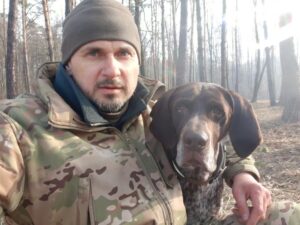After Russia invaded Ukraine, filmmaker Oleh Sentsov postponed the promotion of his new film Rhino and joined the civilian territorial defence forces. “For the last week, I’ve been standing in the trenches as a participant of the territorial defence of Kyiv, which is part of the Armed Forces of Ukraine,” Sentsov informed his Facebook followers.
The former political prisoner, author and social activist felt a duty to do his part. “I just feel like I still need to do something. My path as a warrior is only at the front lines,” the 45-year old said.
He’s also rousing his fellow citizens, “The enemy wants to destroy Ukraine and its people. Everyone take up arms! Go to recruitment offices, join the army, sign up for the self-defence, give blood, help the front, and demonstrate in occupied areas.”

Oleh Senstov with duty Kanine Parker (Photo Credit: Oleh Sentsov Facebook)
Born into an ethnic Russian family in Simferopol in Crimea, Sentsov studied economics in Kyiv in the 1990s. A long-time movie buff, he pursued his passion by studying film directing and screenwriting in Moscow, then making two short films A Perfect Day for Bananafish (2008) and The Horn of the Bull (2009), followed by the feature-length film, Gamer.
History interrupted production of his next feature film, Rhino, in 2014. Sentsov joined the Euromaidan movement and made frequent trips to Simferopol to organize rallies and help distribute food and supplies to Ukrainian military trapped in Crimea. He drew worldwide attention when he was arrested for alleged terrorism on May 10, 2014 by Russian State Security in occupied Crimea.
“They threw me into a minivan, placed a bag over my head and drove to the former SBU [Security Service of Ukraine] building,” Sentsov described his capture to the local press. “Then they began a very brutal interrogation. … They started to beat my legs and arms….. When I refused to talk, they started to choke me.”
His captors immediately recognized Sentsov’s indomitable spirit which they were keen to suppress. He was denied contact with lawyers and Ukrainian consular assistance. Formal charges dragged out a year and he even received a longer sentence than his co-accused – 20 years in a hard labour penal colony. During his sentencing on August 25, 2015, Sentsov remained defiant, singing the Ukrainian national anthem.
Sentsov distinguished himself among other Ukrainian political prisoners by his resilience and continued activism behind bars. Notably, he went on a 145-day hunger strike, demanding that all Ukrainian political prisoners be freed. The European Parliament recognized Sentsov’s activism with the Sakharov Prize for Freedom of Thought in 2018.
Sentsov returned to Ukraine on September 7, 2019 as part of a prisoner exchange. Hailed as a hero in Ukraine, he faced pressure to enter politics. Other veterans of the Donbas war and Maidan activists succumbed to the allure of high-level politics, often with disappointing results. Sentsov was in demand to tell his story, and public expectation was high for him to document his prison experiences in film. But he just wanted to resume filmmaking and complete work on Rhino.
“Everyone waited for me to make political films about prison or Maidan, but now I want to pursue a civilian life,” Sentsov said in one interview.
Still, Rhino is an important story for today. It tells a gloomy and realistic story of a gang leader in a mid-sized industrial town during the 1990s, a time of the flourishing black market, criminal gangs and desperate citizens trying to get ahead. “I want to show how that world is, and to show young people that it’s not cool, it’s not fun,” he said.
“[Ex-president Viktor] Yanukovych turned Ukraine into a bandit state. I just showed where the roots of it come from,” Sentsov explained. “Many people who rose during those times now govern our country in one way or another.”
Sentsov explores the early roots of how those born and raised to be good soviet citizens had to suddenly adjust to capitalism during tremendous social and political changes. “They are from those times and the way they see the world is from those times too,” he said.
He also wanted to educate the younger generations and foreign audiences about Ukraine’s struggles during the 1990s. “They have not experienced any of this,” he said. “That is why it is a chance for them to understand us better.”
Critics questioned the film’s use of Ukrainian when criminal gangs in the 1990s largely spoke their own dialect of Russian. Sentsov explains he’s following the State Film Agency’s language requirement, but it’s also his own policy. “We should be promoting the Ukrainian language, which is our cultural asset,” Sentsov added. He himself has switched to using Ukrainian, having grown up using Russian.
Rhino debuted at the Venice Film festival last September and since then has made the circuit of international film festivals in Georgia, Poland, Sweden, France, India and the USA. It even won Best Artistic Film and Best Actor at the Stockholm Film Festival in November 2021. Sentsov had been promoting Rhino across Ukraine in the days before Russia invaded. It opened in Ukrainian theatres on February 17 with a Kyiv debut. The typically low-key Sentsov rode the metro to the Kyiv premiere where most would have gone by car.
Sentsov’s Russia experiences did nothing to diminish his social activism. He continues to call for the return of the 120 Ukrainian political prisoners still incarcerated in Russia and Crimea and for the 270 military and civilian prisoners still being held in occupied eastern Ukraine.
Since February, Sentsov has been calling for the film community to boycott Russian cinema. “In 2014, I was unlawfully imprisoned in Russia and sentenced to 20 years of imprisonment for fighting against the Putin regime and annexation of Crimea. Back then, the whole film industry stood up to support me. And I am immensely grateful for it. Now I’m asking you to support my country.”
As international film festivals get under way, they face this moral question: Do they follow the lead of business and governments by banning Russian films and film cooperation? The Denmark festival in March added three Ukrainian films and showed three Russian films containing anti-Putin themes. Other festivals like Cannes, Venice, Berlin and Toronto took a softer approach by not completely excluding Russian filmmakers, but allowing dissident voices. The Oscar Awards on March 28 held a minute’s silence for those suffering as a result of Russia’s ongoing invasion.

A message in support of Ukraine is displayed on a screen onstage during the 94th Oscars at the Dolby Theatre in Hollywood, California. (Photo by ROBYN BECK / AFP)
Sentsov’s time in Russia solidified his thoughts about the current war. Unlike those trying to keep diplomatic channels open, Sentsov believes there can be only one resolution of the war – a Ukrainian victory.
“There can be no negotiating with Putin. He is an international criminal against humanity. He should be tried in The Hague,” Sentsov wrote in a Facebook post on February 27.
“After 8 years we again are standing before an even greater danger that has as its goal to destroy Ukraine,” he wrote. “We only need one thing for a victory in this war – to resist, like we resisted 8 years ago and we continue to do so to today. I have no doubt in the determination of the Ukrainian people and the future victory over the aggressor.”
After five years in a Russian hard labour penal colony, one could have expected him to be bitter and out for revenge. He could have used his public popularity to enter politics, nab a cozy government job or leave the country, forgetting about other Ukrainian prisoners.
Instead, Sentsov wanted to pick up where he left off in 2014 – making films and getting involved in community activism. In the two years since his release, he has published five books, completed a film and debuted it on the world stage, and advocated for human rights at many forums.
“Oleh is a real warrior, a symbol of courage and determination. He endured torture. He was at the forefront of the Maidan and fought for the independence of our country,” said Hennadiy Afanasyev, ex-political prisoner arrested with Sentsov. “Sentsov is a true hero and a patriot of Ukraine. It’s these kinds of people who become the symbols of a new Ukraine.”
Sentsov’s strength of character is a lesson to all. And during this brutal war with Russia, he reminds fellow defenders of their ultimate goal.
“In every situation you have to look for the positives. And the positive in this situation is that we can resolve this situation once and for all – return our territory, gain our independence, join NATO, join the EU, and break the back of Russia so that our children don’t have to go to war again.”

Oleh Sentsov stands near a check point in the capital Kyiv on March 20, 2022. (Photo by FADEL SENNA / AFP)
Marusia Kaweski is a Canada-based author and journalist who lived and worked in Ukraine for 20 years.
